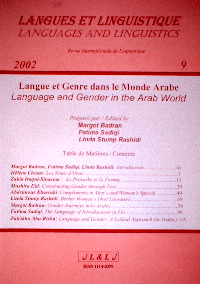pp. 69-78
Linda Stump Rashidi
Abstract
In the political, religious,
educational, and public world of Morocco, male Arab discourse is the voice
of the people. But in many parts of the countryside, the discourse of the
real world is Berber and female—and of necessity oral, as these women are
overwhelmingly illiterate. Berber Women’s Oral Narrative. All three
modifiers—Berber, women, oral—indicate the marginalization of this genre
within the wider world, but the orature that prescribes the lives of the
Berber women of the Anti Atlas Mountains is certainly mainstream within its
own culture. It is through this oral tradition that women have succeeded in
maintaining the Berber culture. As these women are brought in the literate
world, however, they are of necessity brought into the modern Westernized
and/or Islamic world. Gaining written literacy almost certainly means losing
orature and the culture that produces it. This is not just a matter of
language; it is a matter of gender equality, of keeping in balance the male
and female worlds, because it is through this oral tradition that women have
succeeded in maintaining not only the Berber language and culture but also a
feminine world view.
This paper is based on ongoing
field research and looks at the orature produced by the women of Dousderm, a
village in the Anti Atlas Mountains of southern Morocco. It argues that
because of the complex sociopoliticolinguistic situation in Morocco today,
recording and study of this orature is important not only for Morocco and
general literary enrichment but also in terms of legitimization of the
voices of women within a traditionally patriarchal, Islamic society. The
discourse of these Berber women, indeed, occupies a separate space.
